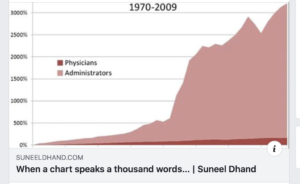Deciding the future of healthcare policy will not be simple, even if we could ignore the politics.

Administrative workers are a significant driver of higher US healthcare costs. Simplify insurance and we reduce administrative burden.
I think everyone agrees on high-level policy aims: a healthy population, access to high-quality care and preventative services, protection from financial loss for health events that are outside one’s control, and cost-effectiveness. (One exception is reproductive health, but let’s put that aside for this blog.)
The debate is all in the “how” do we improve (or even replace) the system. The discussion pits Democrats against the GOP and candidates within each party against each other.
Here are some critical areas of disagreement that will influence voter choices this election year:
Do we create a single-payer system (e.g., Medicare-for-all)? Or, do we continue with our current hodgepodge of government, employer, association, and individual payers?
- Advantages of a single-payer system: Simplicity, lower administrative costs for the nation, and broader sharing of risk, which is what insurance is meant to do.
- Disadvantages of a single-payer system: Enormous disruption and a lot of losers. Also, higher wages will be needed to make a single-payer system affordable to families. I don’t think we can assume that employers will shift cost savings from healthcare to higher wages. A lot of citizens may be mad at the result of a single payer policy.
My vote: Medicare for all who want it, including employers offering the public plan to employees while covering part of its cost. If that option is best, the US healthcare system will migrate towards a single-payer system. By broadening the Medicare risk pools, we spread more risk and better manage premiums.
To what extent should individuals and families be at financial risk for their health?
Families are bearing more of the financial risk of care due to rising co-pays and out-of-pocket ceilings. This rise is part of the alarm about healthcare being too expensive. Should individuals and families continue to bear this burden?
- Many say “yes,” though usually with the caveat that the financial burden should be limited. Even Medicare has deductibles (which can be offset by purchasing secondary insurance).
- Others say “no,” as in Bernie Sanders’ plan. Again, simplicity seems to be the argument here.
My vote: If we move to a single-payer system (mandated or “if wanted”), we should continue with the current Medicare approach of co-pays while offering HMO-type Medicare Advantage coverage for individuals who wish to have no financial risk. No matter what the outcome, let’s also consider policies to cap individuals’ financial risk (perhaps as a percent of their income) so that employer-provided insurance is affordable insurance.
Should for-profit insurers have a role?
For-profit insurers administer 40% of the Medicare plans of seniors through Medicare Advantage, much to the delight of many seniors. They also do the benefits administration work for both government plans and for employers who self-insure. (Almost 80% of employers with over 1000 employees self-insure.) Do insurers have a role in the future?
- The “yes” camp argues that, at a minimum, insurers should have a role in population health risk management, which requires skillsets our government does not have. Note that an insurer can also be a provider (e.g., Kaiser), or can operate independent of providers (e.g., Cigna). Even a single-payer system should contain population health management for cost effectiveness, and that is a role that for-profit insurers could play.
- The “no” camp” is full of the Far Left. I see no argument in favor of eliminating insurance companies (if it is even feasible). You could force them to be non-profit, but that would require the government to repay shareholders, which could be terribly expensive.
My vote: Retain insurers but change the basis of competition so that insurers’ compete on offering the best health outcomes for the amount of money the payer spends. This market works in Medicare Advantage and self-insured employers. Why not for everyone?
How do we lower costs?
While insurance providers get much of the blame for making our healthcare system so expensive, there are many other cost drivers. We need solutions to lower costs of physicians, healthcare technologies, pharmaceuticals, therapeutic biotech, and so on.
Look for these cost-saving strategies in any candidate’s healthcare proposal:
- Mandate federal contracting for drugs (for Medicare, Medicaid and VA Health) as every other nation does.
- Advance telehealth and remote patient monitoring to deal with clinician shortages, especially in rural areas.
- Test pharmaceuticals for the cost-effectiveness of care before approving.
- Pursue anti-trust analysis of generic drug pricing (in theory, pricing should be much lower, suggesting some market irregularity exists).
- Reform medical school financing and schooling to encourage more primary care physicians.
- Invest in creating many more non-MD care providers who can tackle day-to-day care issues not requiring the advanced training of MDs.
- Provide information on the quality and cost of care so that patients are guided to the highest value providers, which some self-insurers are now doing. Public information will also encourage providers to improve the value of care.
Healthcare policy solutions are needed. What do you think is the right way forward?

Leave a Reply